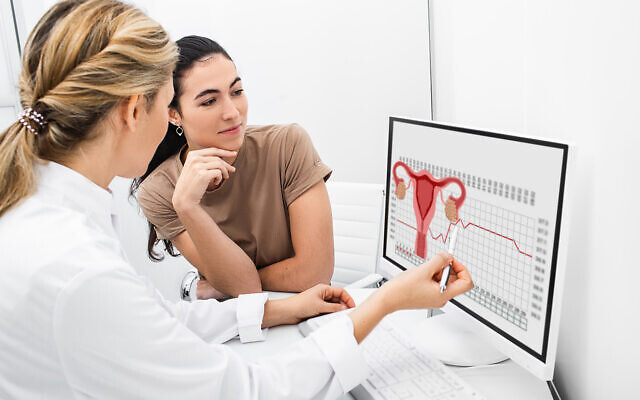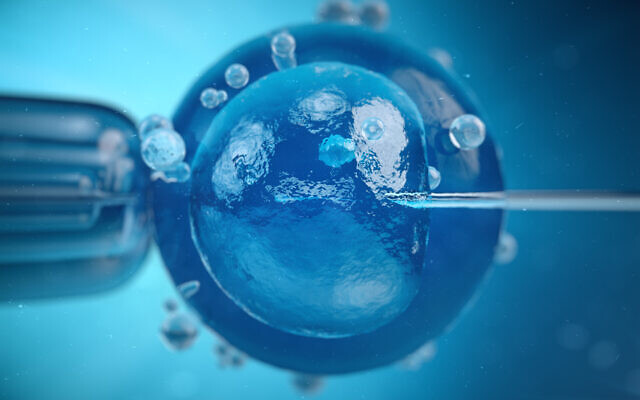A Jerusalem lab says it has “reverse aged” human eggs from women at the end of their child-bearing years to make them more like eggs from a 20-year-old.
In new peer-reviewed research published Tuesday, scientists from the Hebrew University of Jerusalem said that they identified a previously unknown aging mechanism, and say they can reverse it by administering anti-viral drugs to the egg in a test tube.
The breakthrough, which has yet to be tested against fertilization, could provide hope for those above 40 years old, whose aged eggs often make miscarriages and congenital defects more common.
The team tested their method on hundreds of mice eggs and then human eggs that had been leftover from IVF cycles and donated to science. They reported that the “reverse aged” eggs have chromosomes that look more like those from younger eggs, have less damaged DNA, and that they mature better in test tubes.
The scientists, who published their research in the journal Aging Cell, stress that there are other similar aging mechanisms in the eggs they haven’t affected. They also say they haven’t yet introduced sperm to eggs that underwent their process, so haven’t shown they have improved fertility — but hope to do so soon.
“Many women are trying to get pregnant aged 40 or over, and we think this could actually increase their level of fertility,” Hebrew University molecular biologist Dr. Michael Klutstein, who led the research, told The Times of Israel.
“Within 10 years, we hope to use anti-viral drugs to increase fertility among older women.”

Illustrative image: a gynecologist discusses fertility with a patient (iStock via Getty Images)
Women become less fertile with age, as their egg cells begin to accumulate genetic damage. By the late 30s, eggs have often accumulated so much damage to the DNA that they are unable to mature and be fertilized. Other complications also become more common in geriatric pregnancies.
Klutstein’s team successfully identified one of the aging processes that prevents the successful maturation of an egg cell.

Illustrative image: sperm is injected in to an egg, in assisted reproductive treatment (iStock via Getty Images)
“A battle happens inside a woman’s body, and eggs are one of the key targets,” Klutstein explained, describing existing research that the team was able to draw on. “What happens is that parts of the DNA have ability to attack and harm other parts of the DNA. They do this so exactly like a virus attacks, by making copies of themselves inside the cell.”

Dr. Michael Klutstein (courtesy of Dr. Michael Klutstein)
He said normally the body is able to mount an effective defense to protect the egg, but with age natural resistance becomes weakened.
“Because the attacking DNA behaves like a virus, we hypothesized that anti-viral medicine administered to eggs may reverse age them and rejuvenate them, and found in our lab that this is the case. We tested hundreds of mouse eggs and then human eggs, which confirmed the hypothesis,” he said.
In the first experiment to assess whether his process increases the chance of reproduction, Klutstein will soon start IVF with “rejuvenated” mice eggs. He is “fairly confident” that it will leads to improved outcomes, and prove a step towards using the innovation to help women.
Do you value The Times of Israel?
If so, we have a request.
Every day, our journalists aim to keep you abreast of the most important developments that merit your attention. Millions of people rely on ToI for fast, fair and free coverage of Israel and the Jewish world.
We care about Israel – and we know you do too. So today, we have an ask: show your appreciation for our work by joining The Times of Israel Community, an exclusive group for readers like you who appreciate and financially support our work.
You’re a dedicated reader

We’re really pleased that you’ve read X Times of Israel articles in the past month.
That’s why we started the Times of Israel ten years ago – to provide discerning readers like you with must-read coverage of Israel and the Jewish world.
So now we have a request. Unlike other news outlets, we haven’t put up a paywall. But as the journalism we do is costly, we invite readers for whom The Times of Israel has become important to help support our work by joining The Times of Israel Community.
For as little as $6 a month you can help support our quality journalism while enjoying The Times of Israel AD-FREE, as well as accessing exclusive content available only to Times of Israel Community members.
Thank you,
David Horovitz, Founding Editor of The Times of Israel